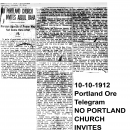Main menu
- ‘Abdu’l-Bahá’s Journey
- World Peace
- Stopping Racism in America
- Empowerment of Women
- More Principles...
- Prayer for America
No Portland Church Invites ‘Abdu’l-Bahá
Persian Apostle of Peace May Not Come Here After All.
In spite of persistent endeavor to interest the religious people of Portland in the coming of ‘Abdu’l-Bahá, the great Persian leader, founder of a world-wide religious movement, not a single invitation from any church or Christian body has been extended to him and not a platform or pulpit placed at his disposal. Even the local peace society has made no effort to extend an invitation to this prominent apostle of universal peace. In New York he was rendered a reception at the Astor House by the New York Peace Society, and later he spoke before the Mohonk Peace Society, everywhere being received with cordiality and enthusiasm.
In London, this apostle of peace, who preaches the oneness of humanity and religions, universal love and the eradication of prejudice, was received by the great men of the government and church. He was a guest of a member of Parliament and the most exclusive churches were thrown open to him. In New York and Chicago this experience was repeated and in Salt Lake recently 10,000 persons [unreadable text] on his words as he delivered his message from the Mormon tabernacle.
Portland pastors on being approached have either declared that he was an “impostor,” a “poseur,” or an “unsafe man.” Some have even gone further and declared him to be a “dangerous man.”
‘Abdu’l-Bahá, his followers assert, is far removed from being an agitator or a stirrer up of dissension. His message is one of peace and his command is one of love. He seeks not to found a new sect, but to remind Christian, Jew, Mohammedan, Confucianist and all others that they are but “leaves of one branch, the fruit of the same tree,” at the root of which is the love of God for man and the love of man for his brother.
Last week he arrived in San Francisco, and from all sides invitations came pouring in from the different clergy who offered him their churches. Sunday night he spoke in the First Unitarian Church and the pastor, Rev. Bradford Leavitt, in introducing him declared he was one of the most distinguished figures of the age, and that the religion that he represented was the most significant of all the great religions of the world. David Starr Jordan has invited him to speak at Stanford University and he has received numerous requests from other educational institutions.
Writing from San Francisco, George Latimer, son of Mr. and Mrs. J. W. Latimer, of this city, says: “It is wonderful the way the papers and the clergy here have received him since his arrival. Many clergymen have called to pay their respects to him, and here is a list of the places he will speak in this week: Unitarian and Congregational churches, Independent Church, Stanford University, Home of Truth, Forum Club, Theosophical Society, the Jewish Synagogue and to the blind people.”
Dressed in a robe of tan, his head covered with a turban of pure white, the Persian gospel leader presented an unique figure as he stood before the altar with the sacred ark of the covenant as his background.
His subject had been announced as “The Fundamental Unity of Religious Thought.” Opening his sermon with the assertion that fundamentally all religion was intended to bring about human advancement, he proceeded to show that basically all religions were alike since their fundamental purposes were the same. If they are the same on this fundamental foundation, he argued, there should be universal religion, a faith marked throughout the world by peace instead of dissension.
Christ had recognized Moses as a prophet, said the preacher, and has declared for the validity of the Mosaic law. Mohammed had done the same, so had the civilized world, said ‘Abdul Bába. Why, then, he asked, should religion divide the world into factions, rife with dissension and hatred?
“Is it not better,” he queried, waving his hands in forceful gesture, “to enjoy living together and unite in the love of God? Then can we observe how this world would grow to a Paradise.”
‘Abdu’l-Bahá said that religion ever helped humanity toward progress and was the cause of everlasting honor among men. As substantial proof to the services done humanity by religion, the Persian preacher told of how Moses had given religion to the Israelites at a time when they were most oppressed and were held in bondage. Religion, he declared, had been responsible for the growth of the Jewish people as a nation after they had been rescued from bondage and had caused their intellectual and moral advancement to a remarkable degree.
All religions, he said, could be divided into two classes. First, that class which concerned moral and ethical teachings, that fundamental basis of the whole belief which makes for human progress. The other division is a matter of rites and customs, he said, changed with the times, and is only incidental.
“The essentials which have to do with development of men are the foundations of all religions, and they are the same,” said the preacher.
It is still doubtful if he will pay a visit to Portland, according to Mr. Latimer’s letter, which said that in a conversation with ‘Abdu’l-Bahá he told him that he had already been obliged to break an appointment in London for October 1, and that he had engagements in the Orient with people who would travel 200 days to get an interview with him.
The followers of ‘Abdu’l-Bahá in Portland, however, in spite of the indifference that is shown by the denominations, and the lack of certainty regarding ‘Abdu’l-Bahá’s movements during the next three weeks, still entertain the hope that he will pay a visit to this city.









